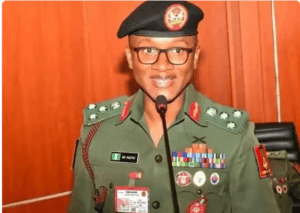“Tinubu Picks Gen. Kunle Nafiu as NYSC Director: Merit or Ethnocentrism?”
By Parrot Newspaper Editorial Board
When leaders assume office, their choices in key appointments reveal more than just governance strategies—they expose underlying values and priorities. In Nigeria, where ethnic and regional divides run deep, the appointment of Brigadier General Kunle Nafiu as the new Director-General of the National Youth Service Corps (NYSC) has reignited conversations about ethnocentrism in leadership.
Ethnocentrism, in simple terms, is the tendency to favor one’s ethnic group or region over others, often at the expense of national unity. It is an unspoken reality in Nigerian politics, where successive governments have been accused of tilting key positions toward their kinsmen, sometimes subtly and sometimes blatantly.
A Pattern Too Familiar?
President Bola Ahmed Tinubu’s appointment of Nafiu, a native of Osun State, follows a pattern observed in many past administrations—favoring appointees from a particular region or ethnic background. While Nafiu’s qualifications are not in question, the issue is whether the president’s selection process reflects a fair, balanced representation of Nigeria’s vast diversity.
The NYSCy, by its very essence, was established to foster national unity. The irony, then, is in appointing a leader to this institution under circumstances that some perceive as regionally skewed. The concern is not about an individual’s competence but about a broader trend where leadership appointments appear to be concentrated in certain regions, leaving other parts of the country feeling excluded.
The Dangers of Ethnocentric Appointments
Ethnocentrism in governance creates a sense of alienation among marginalized groups, fostering distrust in the system. When citizens notice an imbalance in leadership, it breeds resentment, weakens national cohesion, and fuels narratives of exclusion. In Nigeria, where ethnic and religious tensions are already high, such patterns can escalate divisions rather than bridge them.
The consequences of ethnocentric governance include:
1. Erosion of Meritocracy: When ethnic loyalty outweighs merit, capable individuals from other regions may be overlooked.
2. Weak National Integration: People from underrepresented regions may feel detached from the central government.
3. Political Tension: Accusations of favoritism can spark political unrest and deepen regional rivalries.

Breaking the Cycle
For Nigeria to progress beyond the shadows of ethnocentric governance, leaders must embrace true inclusivity. A deliberate effort to balance appointments across all regions will not only silence critics but also restore faith in national institutions.
The conversation should not be about Brig. Gen. Nafiu alone but about whether our leadership genuinely reflects the diversity of Nigeria. If competence remains the only criterion, then every region should have an equal shot at representation in governance.
Final Thoughts
The NYSC represents a vision of one Nigeria, where young people from different backgrounds come together in service to the nation. The leadership of such an institution should reflect this very spirit. Ethnocentrism, if left unchecked, will continue to hinder national growth and foster unnecessary divisions.
In the end, the question remains: Are we appointing the best minds for national growth, or are we merely reinforcing ethnic comfort zones?


